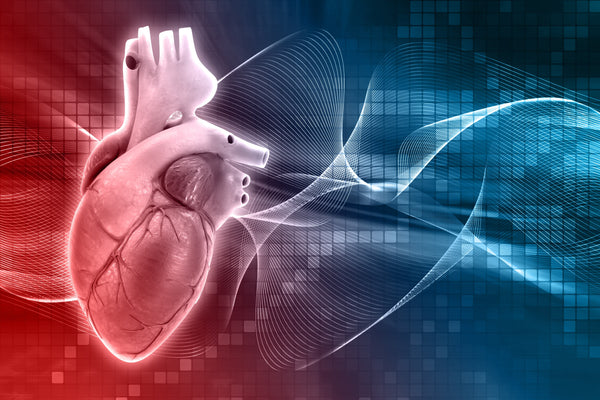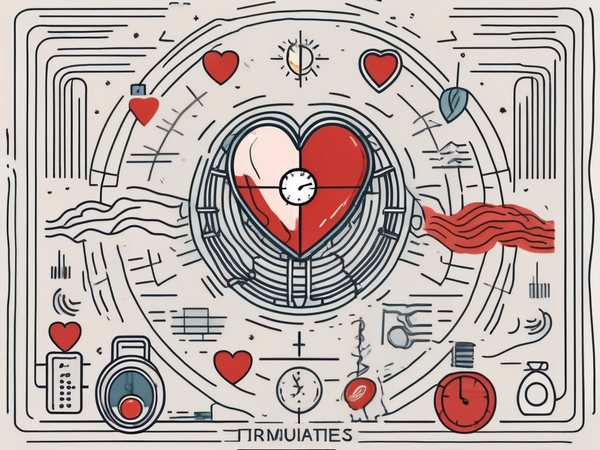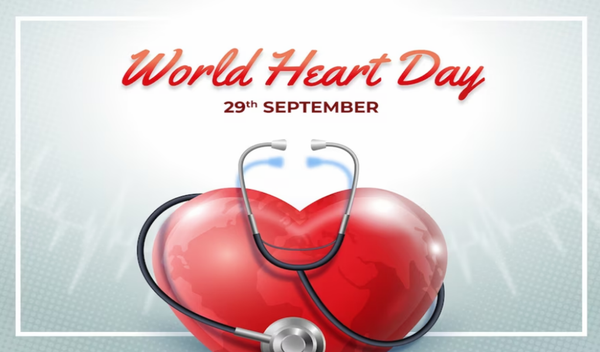Did you know your brain and the heart have a connection and can affect each other in so many different ways? If you have mental health is balanced, you will be at low risk of cardiovascular diseases and several heart conditions. A happy healthy mind resonates to heart health. That is all because of the clear linking of your head and heart. This World Heart Day, let us find the triggers that affect the mental health and strive to work towards improving your mental and heart health.
World Heart Day is celebrated on September 29 every year to spread awareness about the cardiovascular disease which causes nearly half of all the non-communicable diseases in the world.
In this blog, we will talk about the relationship between mental health and heart disease and this world heart day, how can we improvise this relationship for your overall well-being.
What Is World Heart Day!
World Heart Day is celebrated every year on 29 September.
In May 2012, world leaders committed to reducing global mortality from non-communicable diseases (NCDs) by 25% by 2025. Cardiovascular disease (CVD) is accountable for nearly half of all NCD deaths making it the world's number one killer.
The 2022 Summit will aim to produce a series of quality discussions across many strands, focusing on the prevention, treatment and management of cardiovascular disease worldwide – around the universal and timely theme of 'Cardiovascular Health for Everyone'
The Link Between the Heart and Head
Remember, whatever you do for your heart will also be good for your brain and vice versa. It might seem that the heart and the brain work differently to fulfill their missions. But there is a strong internal connection between them.
The heart works by pumping blood throughout the body and supplies nutrients to all your organs. The brain or mind is the command center of the body that controls your thoughts, what you say, and what you do.
However, according to research, scientists have found a close relationship between the working of your heart and head and how they influence each other. That means if your cardiovascular health is affected, your cognitive health will also be affected. And any measures to take care of cardiovascular health will also indirectly help cognitive health. Let us learn about that in detail.
The Relationship Between Mental Health and Heart Diseases
The head and heart connection and the relationship between mental health and heart diseases should be under everyone’s radar. That is because the biological and chemical factors that trigger mental health also affect the heart and influence heart diseases.
Depression and Heart Diseases
If you have depression, you will know how it hurts your heart emotionally. But did you know that depression can also affect your heart physically?
Depression can increase the risk of heart issues by up to 60%. And according to the American Heart Association reports, every one in five heart patient’s experiences depression. Here’s what depression can do to your heart: -
- Depression most often comes from unmanaged stress that further leads to high blood pressure, irregular heartbeats, arterial damage, and a weakened immune system.
- People with depression are prone to adverse cardiac events like heart attacks or blood clots.
- Depression is also harmful to people without heart disease as it can still pose a risk of a heart attack or coronary heart disease.
- Negative lifestyle habits related to depression-like smoking, drinking alcohol, excessive sleeping, and poor diet, can also interfere with the health of your heart and heart treatments.
Anxiety and Heart Diseases
Anxiety can affect the condition of your heart in so many ways. Panic attacks are usually common among people with anxiety. Panic attacks are like mimics of heart attacks, and many who have experienced them may even feel as if they are going through a heart attack.
Sweating and numbness on hands and feet, shortness of breath, chest pain, etc., are the symptoms of both a panic attack and a heart attack. The stress hormones released during a panic attack can lead to high blood pressure and temporarily put pressure on your heart. Here’s how anxiety affects your heart: -
1. Rapid Heart Rate –
In severe cases, anxiety can interfere with your heartbeat, making it beat much faster, leading to a rapid heart rate. Therefore, increasing the risk of a sudden cardiac arrest.
2. Increase in Blood Pressure –
Anxiety can cause dramatic spikes in blood pressure. If to an increased level, high blood pressure can lead to coronary heart disease weakening the heart muscle, followed by heart failure.
Anxiety can impact your recovery if you are already suffering from heart disease or have underlying heart issues. That is because anxiety can interfere with: -
- Taking prescribed medications
- Reconnecting with family members and friends
- Affect your appetite
- Sticking to a workout regime
Who is at a Higher Risk of getting Heart Disease from Mental Health Disorders?
1. Women –
According to studies, women suffering from PTSD or anxiety are more prone to risk for coronary heart disease and damaging effects on physical health.
2. Veterans –
Veterans are more prone to heart diseases, majorly due to PTSD as a result of combat.
3. Minorities –
People from ethnic or racial minority classes or other minority groups are prone to heart diseases due to bad mental health. A lot of them suffer from depression, anxiety, stress, or the social disparities they suffer from place and place and from time to time.
4. Smokers –
Individuals with high stress levels often turn to smoking to experience a sense of relaxation. Smoking is a major cause of cardiovascular disease (CVD) and causes approximately one of every four deaths from CVD, according to the 2014 Surgeon General’s Report on smoking and health. Smoking cigarettes with lower levels of tar or nicotine does not reduce the risk for cardiovascular disease. Chemicals in cigarette smoke causes the cells that line blood vessels to become swollen and inflamed and also increases the formation of plaque in blood vessels. This can narrow the blood vessels, increase the risk of blood clots and can lead to many heart complications.
5. Obesity –
Obese adults had a 55% higher risk of developing depression over their lifetime. People experiencing depression, anxiety, stress, and even PTSD over a long period of time may experience certain physiologic effects on the body, such as increased cardiac reactivity such as, increased heart rate and blood pressure, reduced blood flow to the heart, and elevated levels of cortisol.
Wrapping Up!
You can take good care of your mental health by setting health goals for yourself that you can achieve slow and steadily. Start celebrating small wins, take time out to be active, connect with family and friends, incorporate foods from all varieties, and provide your body with the right nutrients, your heart will also be healthy. Foods like Oats, Barley, Nuts, seeds, whole grains, leafy greens, and fruits which are high in Magnesium, zinc, and B vitamins all work to help you decompress after a long day and also reduce risk of heart disease.
It will be an added benefit to incorporate supplements that induce Calm and Relaxation that contribute to relieving anxiety and stress and uplifting your mood. Opt for supplements consisting of Suntheanine that stimulates alpha waves to promote a relaxing effect on your mind and Chamomile to reduce anxiety and stress.
Heart conditions can impact several aspects of life, and so does bad mental health. That is why you must take complete care of your body and ensure that you are happy and healthy from the inside.
If you think you're suffering from a mental health disorder that is affecting your heart health or vice versa, remember you are not alone. Seeking help would be the best thing you can do for yourself.
References
control of cardiovascular diseases. Glob Heart. 2015 Sep;10(3):221-4. doi: 10.1016/j.gheart.2015.08.003. PMID: 26407518; PMCID: PMC4584120. https://www.ncbi.nlm.nih.gov/pmc/articles/PMC4584120/
InformedHealth.org [Internet]. Cologne, Germany: Institute for Quality and Efficiency in Health Care (IQWiG); 2006-. How does the heart work? 2011 Dec 6 [Updated 2019 Jan 31]. Available from: https://www.ncbi.nlm.nih.gov/books/NBK279249/
Kulshreshtha A, Goetz M, Alonso A, Shah AJ, Bremner JD, Goldberg J, Vaccarino V. Association Between Cardiovascular Health and Cognitive Performance: A Twins Study. J Alzheimers Dis. 2019;71(3):957-968. doi: 10.3233/JAD-190217. PMID: 31476151; PMCID: PMC6918828. https://www.ncbi.nlm.nih.gov/pmc/articles/PMC6918828/
Zhou Y, Zhu XP, Shi JJ, Yuan GZ, Yao ZA, Chu YG, Shi S, Jia QL, Chen T, Hu YH. Coronary Heart Disease and Depression or Anxiety: A Bibliometric Analysis. Front Psychol. 2021 Jun 3;12:669000. doi: 10.3389/fpsyg.2021.669000. PMID: 34149564; PMCID: PMC8211422. https://www.ncbi.nlm.nih.gov/pmc/articles/PMC8211422/
Kubzansky LD, Koenen KC. Is posttraumatic stress disorder related to development of heart disease? An update. Cleve Clin J Med. 2009 Apr;76 Suppl 2(Suppl 2):S60-5. doi: 10.3949/ccjm.76.s2.12. PMID: 19376986; PMCID: PMC2746556. https://www.ncbi.nlm.nih.gov/pmc/articles/PMC2746556/
Abbasi B, Kimiagar M, Sadeghniiat K, Shirazi MM, Hedayati M, Rashidkhani B. The effect of magnesium supplementation on primary insomnia in elderly: A double-blind placebo-controlled clinical trial. J Res Med Sci. 2012 Dec;17(12):1161-9. PMID: 23853635; PMCID: PMC3703169. https://www.ncbi.nlm.nih.gov/pmc/articles/PMC3703169/






















 DOWNLOAD NOW
DOWNLOAD NOW
